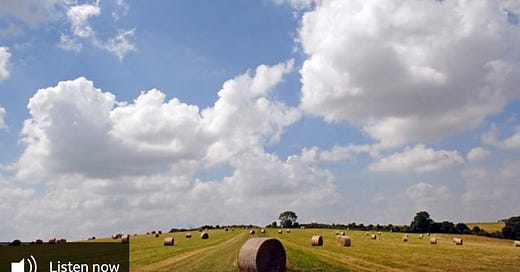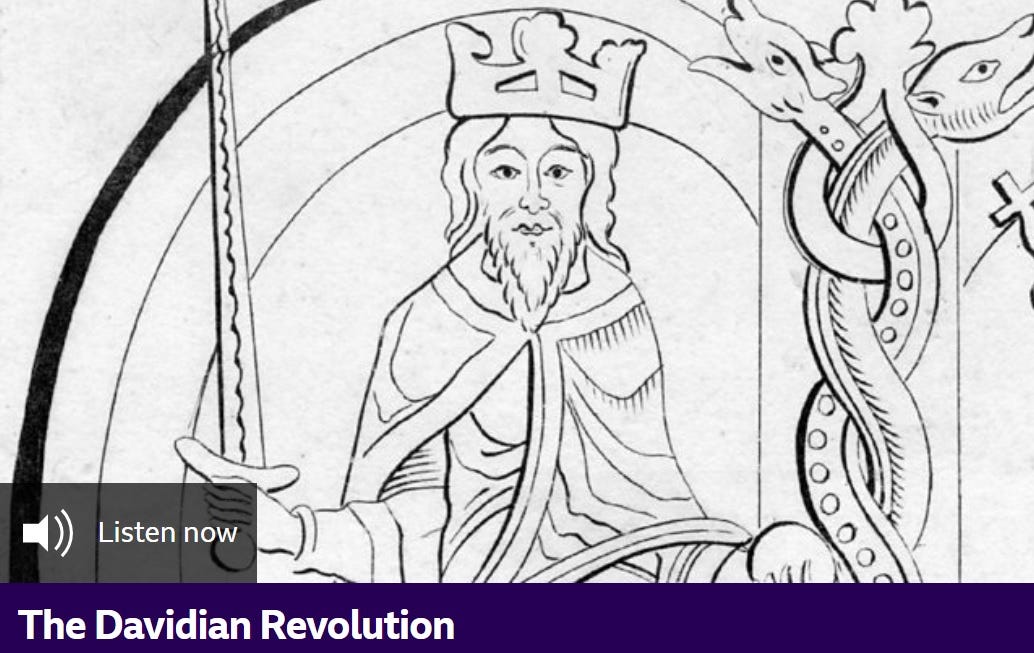All you wanted to know about the Picts in 10 podcasts (and videos)
A guided journey through Pictish history from the Iron Age to the 12th century
If you’re following this blog, it probably means you’re at least slightly interested in the Picts and early medieval Scotland in general. Maybe you’d even like to deepen your knowledge a bit.
If that’s the case, this post is for you! I’ve assembled 10 podcasts and videos that explore the history and archaeology of late antique and early medieval Scotland – from the proto-Picts of the Roman Iron Age to the accession of David I in 1124 and the end of the early medieval period in Scottish history.
I’ve enjoyed all of these over the past year and some I’ve watched/listened to multiple times. Hope you find some interesting stuff here too.
1. The Essay: The Maeatae
The origin legend of the Picts has them arriving en masse in Scotland from Scythia, but in reality they were descendants of the various tribes living north of the Firth of Forth during the Iron Age.
One of those tribes, the Maeatae, was based in the Ochil Hills, where they’re memorialised in the name Dumyat (‘hillfort of the Maeatae’). From this vantage point they would have observed Septimius Severus’s army marching north in 208 AD in a (failed) attempt to conquer the farthest reaches of the island of Britannia.
In this spoken essay for BBC Radio 3, playwright David Greig considers what this Roman invasion must have looked like from the Maeatae’s point of view, as he goes for an atmospheric night-time run in the Ochils.
Running time 14 minutes
2. In Our Time: The Picts
Melvyn Bragg gathers three leading historians and archaeologists of early medieval Scotland to discuss the origins, achievements and demise of the Picts - from the time of the Roman invasion to the disappearance of the Pictish kingdom(s) around 900 AD.
Professor Katherine Forsyth (University of Glasgow), Dr Alex Woolf (University of St Andrews) and Professor Gordon Noble (University of Aberdeen) answer questions about Pictish identity, sculpture, religion, language, writing, politics and the ever-enigmatic Pictish symbols.
Running time 57 minutes
3. The Picts: From Enemies of Rome to Powerful Kingdoms of Early Medieval Scotland
Most of what we know about the Pictish period comes from archaeological discoveries – and a huge number of these have come to light under the supervision of Gordon Noble, who leads the University of Aberdeen’s long-running and award-winning Northern Picts project.
In this 2021 online talk to the Royal Philosophical Society of Glasgow, he highlights the project’s extensive excavation work and answers questions about key Pictish sites including Rhynie, Tap o’ Noth, Dunnicaer and Burghead.
Running time 1 hour 23 minutes
4. History Extra: The Picts
In 2019, Gordon Noble and Dr Nicholas Evans of the University of Aberdeen published an excellent collection of papers on northern Pictish archaeology and history, titled The King in the North: The Pictish Realms of Fortriu and Ce.
In this 2020 podcast from BBC History Extra, they explain the importance of archaeology to understanding Pictish society and culture, and recap some of the most important discoveries to date.
One such discovery is that a clutch of Pictish symbol stones from the promontory fort of Dunnicaer could be dated to the 3rd or 4th century AD - showing that this Pictish ‘writing system’ was already in place at the time of the Roman occupation of Britain.
Running time 50 minutes
5. Nordic Mythology Podcast: Portmahomack, Monastery of the Picts
Dr Mathias Nordvig (University Colorado Boulder) and Daniel Farrand of the Nordic Mythology Podcast host a highly enjoyable interview with Professor Martin Carver (University of York), who led the large-scale excavations of the Pictish monastery at Portmahomack on the Tarbat peninsula from 1996 to 2007.
Martin Carver explains how the digs shed stunning new light on culture, religion and ideology in the northern Pictish kingdom of Fortriu – including confirmation for the first time that the Picts were as literate as their contemporaries in England and Ireland.
(Many thanks to Heather Wallace for pointing me in the direction of this podcast!)
Running time: 1 hour 22 minutes
6. War and Warriors on Pictish Sculpture
John Borland arguably has more detailed knowledge of Pictish art than anyone else, thanks to his career as Historic Environment Scotland’s Measured Survey manager, during which he has recorded and drawn hundreds of early medieval carved stones.
In this Zoom talk for the Society of Church Archaeology’s 2018 conference, he looks at images of armed nobles and battle scenes on Pictish carved stones, to see what they can tell us about the practice and perceptions of war in early medieval Scotland.
Does the Aberlemno Battle Stone record the Pictish victory over Northumbrian invaders at the Battle of Nechtanesmere in 685 AD? Does Sueno’s Stone in Forres commemorate the murder of King Dubh of Alba in 966 AD? Watch and find out! (Maybe.)
Running time 57 minutes
7. East is East and West is West: World Systems and the Moray Firth in Late Antiquity
Alex Woolf of the University of St Andrews is the pre-eminent historian of Pictish-era Scotland, but it’s quite hard to find any of his public lectures online.
This is a notable exception: a lecture given at Inverness Museum in 2016 on the changing balance of power and influence in the 7th and 8th centuries between Gaelic-speaking Dál Riata and Pictish-speaking Fortriu – the two kingdoms at either end of the Great Glen.
Alex Woolf picks through the meagre historical sources and recent archaeological discoveries in an effort to persuade the audience that Pictish history is more than just “a list of people with funny names killing each other”.
Running time 59 minutes
8. Gone Medieval: The Origins of Scotland
Archaeologist Dr Adrián Maldonado is a highly engaging public historian, tasked with understanding and interpreting the huge collection of early medieval artefacts housed in the National Museum of Scotland in Edinburgh.
As the Glenmorangie Research Fellow at the NMS, his research into the period culminated last year in a beautifully-illustrated book, Crucible of Nations: Scotland from Viking Age to Medieval Kingdom.
In this podcast, he talks to Dr Cat Jarman about what artefacts like the Forteviot Arch and silver dirhams from the Isle of Skye tell us about politics, trade, warfare and ethnic identities in northern Britain in the 9th-12th centuries, prior to the emergence of the medieval kingdom of Scotland.
Running time 39 minutes
9. Rediscovering Viking-Age Scotland with Michael Wood
Another talk to promote Crucible of Nations, this one sees Adrián Maldonado and Sally Magnusson joined by historian and broadcaster Michael Wood, who gives a virtuoso talk on how one 10th-century Scottish king, Constantine II, was perceived by his contemporaries in England.
Constantine was one of the instigators – and losers – of the Battle of Brunanburh in 937 AD, widely seen as a pivotal event in the making of England as we know it.
Michael Wood traces the road to Brunanburh through entries in the Anglo-Saxon Chronicle and elsewhere, including Æthelstan’s invasion of Scotland in 934 AD, and Constantine’s (no doubt reluctant) presence as a client king at Æthelstan’s court.
If you’re more familiar with the kings of Wessex than the kings of Alba, this talk provides an excellent peek into the dynamics between the emerging kingdoms of England and Scotland in the century before the Norman conquest.
Running time 1 hour 4 minutes
10. In Our Time – The Davidian Revolution
Rounding off the top 10, this episode of In Our Time looks at Scotland at the very end of the early medieval period, with the accession in 1124 of David I and the start of what might be thought of as the ‘Anglo-Norman’ period of Scottish history.
Melvyn Bragg is joined by Alex Woolf, Professor Alice Taylor (King’s College London) and Professor Richard Oram (University of Stirling) to discuss the impact of David I of Scotland on his kingdom and neighbouring lands.
They explain how David instigated a revolution that saw the introduction of new burghs, new monasteries, a monetary economy, and new ways of governing. Scotland was now a medieval European kingdom that had left its Pictish past firmly behind it.
Running time 50 minutes





